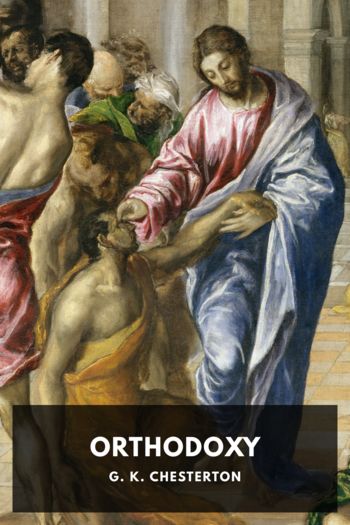Heretics - G. K. Chesterton (novels to improve english TXT) 📗

- Author: G. K. Chesterton
Book online «Heretics - G. K. Chesterton (novels to improve english TXT) 📗». Author G. K. Chesterton
A critic once remonstrated with me saying, with an air of indignant reasonableness, “If you must make jokes, at least you need not make them on such serious subjects.” I replied with a natural simplicity and wonder, “About what other subjects can one make jokes except serious subjects?” It is quite useless to talk about profane jesting. All jesting is in its nature profane, in the sense that it must be the sudden realization that something which thinks itself solemn is not so very solemn after all. If a joke is not a joke about religion or morals, it is a joke about police-magistrates or scientific professors or undergraduates dressed up as Queen Victoria. And people joke about the police-magistrate more than they joke about the Pope, not because the police-magistrate is a more frivolous subject, but, on the contrary, because the police-magistrate is a more serious subject than the Pope. The Bishop of Rome has no jurisdiction in this realm of England; whereas the police-magistrate may bring his solemnity to bear quite suddenly upon us. Men make jokes about old scientific professors, even more than they make them about bishops—not because science is lighter than religion, but because science is always by its nature more solemn and austere than religion. It is not I; it is not even a particular class of journalists or jesters who make jokes about the matters which are of most awful import; it is the whole human race. If there is one thing more than another which anyone will admit who has the smallest knowledge of the world, it is that men are always speaking gravely and earnestly and with the utmost possible care about the things that are not important, but always talking frivolously about the things that are. Men talk for hours with the faces of a college of cardinals about things like golf, or tobacco, or waistcoats, or party politics. But all the most grave and dreadful things in the world are the oldest jokes in the world—being married; being hanged.
One gentleman, however, Mr. McCabe, has in this matter made to me something that almost amounts to a personal appeal; and as he happens to be a man for whose sincerity and intellectual virtue I have a high respect, I do not feel inclined to let it pass without some attempt to satisfy my critic in the matter. Mr. McCabe devotes a considerable part of the last essay in the collection called “Christianity and Rationalism on Trial” to an objection, not to my thesis, but to my method, and a very friendly and dignified appeal to me to alter it. I am much inclined to defend myself in this matter out of mere respect for Mr. McCabe, and still more so out of mere respect for the truth which is, I think, in danger by his error, not only in this question, but in others. In order that there may be no injustice done in the matter, I will quote Mr. McCabe himself. “But before I follow Mr. Chesterton in some detail I would make a general observation on his method. He is as serious as I am in his ultimate purpose, and I respect him for that. He knows, as I do, that humanity stands at a solemn parting of the ways. Towards some unknown goal it presses through the ages, impelled by an overmastering desire of happiness. Today it hesitates, lightheartedly enough, but every serious thinker knows how momentous the decision may be. It is, apparently, deserting the path of religion and entering upon the path of secularism. Will it lose itself in quagmires of sensuality down this new path, and pant and toil through years of civic and industrial anarchy, only to learn it had lost the road, and must return to religion? Or will it find that at last it is leaving the mists and the quagmires behind it; that it is ascending the slope of the hill so long dimly discerned ahead, and making straight for the long-sought Utopia? This is the drama of our time, and every man and every woman should understand it.
“Mr. Chesterton understands it. Further, he gives us credit for understanding it. He has nothing of





Comments (0)